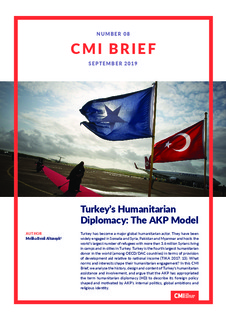| dc.contributor.author | Altunısık, Meliha Benli | |
| dc.date.accessioned | 2019-09-27T14:00:06Z | |
| dc.date.available | 2019-09-27T14:00:06Z | |
| dc.date.issued | 2019-09-01 | |
| dc.identifier | oai:www.cmi.no:6973 | |
| dc.identifier.citation | Bergen: Chr. Michelsen Institute (CMI Brief no. 2019:08) 5 p. | |
| dc.identifier.issn | 0809-6732 | |
| dc.identifier.uri | http://hdl.handle.net/11250/2619180 | |
| dc.description.abstract | Turkey has become a major global humanitarian actor. They have been widely engaged in Somalia and Syria, Pakistan and Myanmar and hosts the world’s largest number of refugees with more than 3.6 million Syrians living in camps and in cities in Turkey. Turkey is the fourth largest humanitarian donor in the world (among OECD/DAC countries) in terms of provision of development aid relative to national income (TIKA 2017: 13). What norms and interests shape their humanitarian engagement? In this CMI Brief, we analyse the history, design and content of Turkey’s humanitarian assistance and involvement, and argue that the AKP has appropriated the term humanitarian diplomacy (HD) to describe its foreign policy shaped and motivated by AKP’s internal politics, global ambitions and religious identity. | |
| dc.language.iso | eng | |
| dc.publisher | Chr. Michelsen Institute | |
| dc.relation | CMI Brief | |
| dc.relation | 2019:08 | |
| dc.relation.ispartof | CMI Brief | |
| dc.relation.ispartofseries | CMI Brief no. 2019:08 | |
| dc.relation.uri | https://www.cmi.no/publications/6973-turkeys-humanitarian-diplomacy-the-akp-model | |
| dc.subject | Humanitarian Diplomacy | |
| dc.subject | The AKP Model | |
| dc.subject | Turkey | |
| dc.subject | Somalia | |
| dc.title | Turkey’s Humanitarian Diplomacy: The AKP Model | |
| dc.type | Report | |
